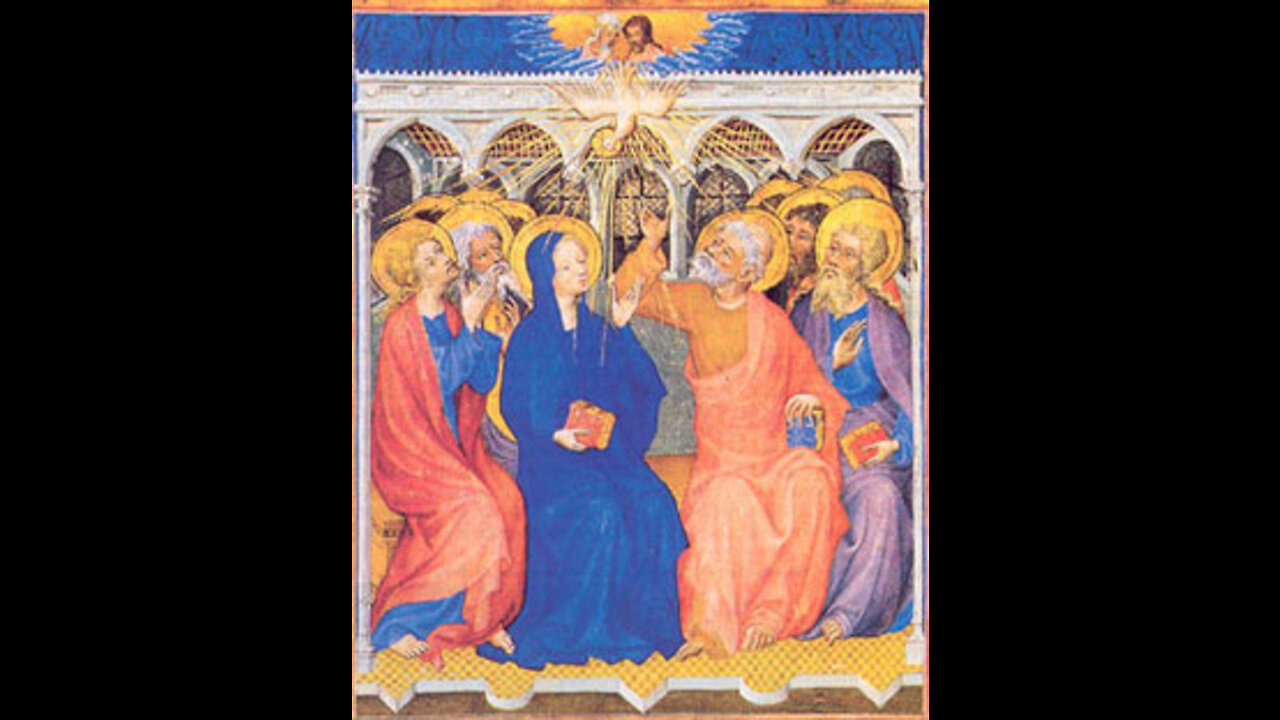Premium Only Content

Confirmation Pre Constantine Be Sealed with the Gift of the Holy Spirit I
I. Confirmation= Latin con (with) + firmare (to firm or strengthen). It is a sacrament in the Roman Catholic and Anglican churches and is equivalent to chrismation in the Eastern Orthodox. It is given to those already baptized in order to make them strong (strengthen) by perfecting or completing the gifts given at Baptism.
During the Pre Constantine period, the word Confirmation was not used. Rather terms manuum impostio (imposition of hands), unction, chrism, or sealing.
II. CCC, 2nd ed guide. Nice summary of sources. Narratio different than encyclopedia. And/both
#1285 “It must explained to the faithful that the reception of the sacrament of Confirmation is necessary for the completion of baptismal grace. For “by the sacrament of Confirmation, [the baptized] are more perfectly bound to the Church and are enriched with a special strength of the Holy Spirit. Hence they are, as true witnesses of Christ, more strictly obliged to spread and defend the faith by word and deed.”
Baptism Moved from Natural life to supernatural grace, Confirmation caps mirror image, strong now for natural life. Completion of Baptism. Strengthening in firmness in soul, specifically purpose Confirmation can become soldier of Christ, interior strength.
NB similar language to Baltimore Catechism. Our Lord wants a relationship with us as mature sons and daughters. #1 CCC “ God, infinitely perfect and blessed in himself, in a plan of sheer goodness freely created man to make him share in his own blessed life.”
II. Confirmation defined, different from Baptism though often given simultaneously with it.
[the Church Fathers and early Christian writers also recognized confirmation as a sacrament distinct from baptism, even though it was usually given simultaneously with baptism. Their words speak powerfully about this anointing and imposition of hands for reception of the Holy Spirit and the role it has in Christian initiation.
#1289 Very early, the better to signify the gift of the Holy Spirit, an anointing with perfumed oil (chrism) was added to the laying on of hands. This anointing highlights the name “Christian,” which means “anointed” and derives from that of Christ himself whom God “anointed with the Holy Spirit.” This rite of anointing has continued ever since, in both East and West. For this reason the Eastern Churches call this sacrament Chrismation, anointing with chrism, or myron which means “chrism.” In the West, the term Confirmation suggests that this sacrament both confirms baptism and strengthens baptismal grace.
Separation in time of two sacraments, child is older, better physical sense extra grace supplied, interesting efficaciousness available coincidentally. Frequently do adults are older children brought into faith. See Sacraments of initiation impacts the individuals.
-
 11:35
11:35
Fides et Ratio
1 year agoIgnatius’ Rules for Discernment Journey to God III
46 -
 LIVE
LIVE
SpartakusLIVE
7 hours agoDuos w/ GloryJean on VERDANSK || #1 Most EATING Streamer
1,581 watching -
 7:25:28
7:25:28
Spartan (Pro Halo esports Player)
8 hours agoSdcrims no comms, then College match
45K -
 34:43
34:43
Stephen Gardner
5 hours ago🚨Trump Lawyer makes TWO HUGE ANNOUNCEMENTS | Benny Johnson
68.5K45 -
 2:17:31
2:17:31
Robert Gouveia
7 hours agoJudge BLOCKS Proof-of-Citizenship! Trump BACK to Supreme Court! Deportee Discovery STAYED!
59.1K26 -
 7:04:37
7:04:37
MyronGainesX
21 hours ago $2.13 earnedCollege Debate Reaction, Jordan Peterson Sells Out, Shannon Sharpe Shakedown!
79.3K26 -
 2:01:49
2:01:49
Joker Effect
3 hours agoWE ARE IN THE WILDWEST! Frontier Legends is crazy!
17.2K -
 3:54:43
3:54:43
FrizzleMcDizzle
4 hours agoELDEN RING and I'm officially a creator on RUMBLE
11.4K -
 1:33:35
1:33:35
theoriginalmarkz
6 hours agoEvening News with MarkZ, joined by Jonathan Otto. 04/24/2025
66.3K6 -
 LIVE
LIVE
Lilpaul112
6 hours agoSolos On the Island / Repo Time With the Brrrap Pack Gang!
75 watching